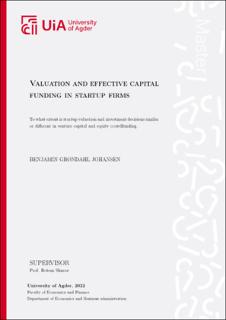| dc.contributor.advisor | Shneor, Rotem | |
| dc.contributor.author | Johansen, Benjamin Grøndahl | |
| dc.date.accessioned | 2022-08-05T16:23:49Z | |
| dc.date.available | 2022-08-05T16:23:49Z | |
| dc.date.issued | 2022 | |
| dc.identifier | no.uia:inspera:110159342:9755803 | |
| dc.identifier.uri | https://hdl.handle.net/11250/3010446 | |
| dc.description.abstract | This thesis will discusses the similarities and differences between venture capital and equity crowdfunding based on reviewing literature and document analysis. Equity crowdfunding is a method of raising money by soliciting small investments from a large number of people. Venture capitalists are individuals or organizations that provide funding to startup companies in exchange for a share of ownership in the company. Venture capitalists typically place more emphasis on the potential return on investment when making decisions about whether to invest in a startup. This is because they are usually investing other people's money and need to generate a profit for their investors. Equity crowdfunding investors, on the other hand, tend to focus more on the products or services offered by the startup and whether they believe in the long-term viability of the business.
The lack of focus on market data and investor experience means that there is a significant knowledge gap between traditional investors and crowd investors. This knowledge gap can be detrimental to the success of a crowdfunding campaign, as it can lead to unrealistic expectations and a lack of understanding of the risks involved. It is important for entrepreneurs to be aware of this knowledge gap and take steps to bridge it, through education and communication with potential investors.
To analyze valuation process of the randomly selected companies I used retrieved valuation documents from the Crowdfunding website Folkeinvest. I downloaded all the available valuation documents of 12 companies that had raised money on Folkeinvest from 2021 to 2022. The average valuation of the chosen companies was MNOK 47. The most used valuation method was Discounted Cash Flows (DCF)-valuation. The funding success rate for the companies that used this method was 66\%. This is compared to a funding success rate of 84\% for the companies that used other methods of valuation or a combination of methodology. When comparing this to other valuation methods from the selection of data, we can see that the other methods generate a higher success rate of funding. This results might be connected to the observations of reviewing the available literature in the section about Decision-making - "Crowds are more interested in product development than financial data" | |
| dc.description.abstract | | |
| dc.language | | |
| dc.publisher | University of Agder | |
| dc.title | Valuation and effective capital funding in startup firms - "To what extent is startup valuation and investment decisions similar or different in venture capital and equity crowdfunding. | |
| dc.type | Master thesis | |
